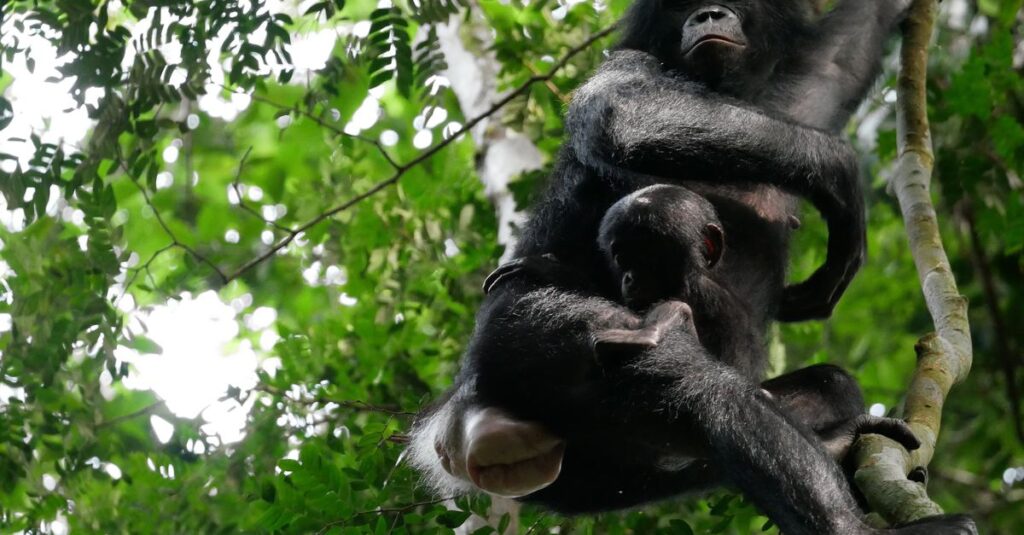Bonobo men are more likely to be aggressive towards each other than chimpanzee men. This is evident from a careful count of aggressive behavior within the group over a series of years in three bonobo groups in Congo and in two chimpanzee groups in Tanzania, all in the wild.
The results surprise the researchers, because bonobos are known to be more peaceful than chimpanzees, the research team led by Maud Mouginot (Université Toulouse Capitole) wrote on Friday. Current Biology. This is the first time that male aggression has been measured so precisely compared to these great ape species.
Dutch primatologist Karline Janmaat, special professor at Artis and at Leiden University, and affiliated with the UvA, responds enthusiastically to the research, in which she was not involved: “A wonderfully educational study.” She is also pleased that attention is being paid to this monkey behavior in their natural habitat “to really understand the evolutionary origins of our own aggressive behavior.” Janmaat: “This research also shows that our idea of the hippie bonobo is not entirely justified.”
Relatives of man
Bonobos and chimpanzees are humans’ closest relatives, with a common ancestor that lived about 6 million years ago. Traditionally, ‘aggressive’ chimpanzees were seen as an image of how ancient humans must have lived. But since more became known about the ‘peace-loving’ bonobos in the 1980s, they have become an alternative to primeval humanity. Bonobos (Pan paniscus) and chimpanzees (Pan troglodytes) have a very different social structure. In chimpanzees the men are dominant and in bonobos the women are dominant. Another difference is that in bonobos, sexual contact (in many shapes and sizes) plays an important role in mutual contact and reconciliation behavior. In chimpanzees, males form coalitions among themselves, but females do not. With bonobos it is exactly the other way around.
The bonobos owe their reputation for peacefulness to this sexual activity, but also to their openness to contact with neighboring bonobo groups. Contact with neighboring groups can lead to murder and manslaughter in certain groups of chimpanzees. In bonobo, these external contacts rarely lead to aggression and more often to sharing food or adoption – mainly by women.
The current research is not about these external contacts, but only about male aggression within the group: chasing someone else, running towards them or direct physically aggressive behavior. The twelve closely examined bonobo males each appeared to perform an aggressive act in the group every four hours on average, of which almost 15 percent actually had physical contact. Of the fourteen carefully observed chimpanzee males, this turned out to be only a third: one aggressive act per twelve hours of observation, of which approximately 15 percent was physical aggression.
Attacking women
There was a big difference in victims: the bonobos attacked women much less often, in 3 percent of the cases. The chimps had no problem with this: more than 30 percent of the attacks were aimed at women – a clear reflection of the differences in social structure. The aggression also benefited the men: in both bonobos and chimps, the most aggressive men had the most mating opportunities and the most offspring.
Although the researchers call for more research, they already have a clear explanation for the greater aggressiveness of bonobo males within the group. Because of their coalition formation, aggression is relatively dangerous for chimp men: if they attack a man from another coalition, they run the risk of being confronted by an entire group. And attacking a man from your own coalition is also not wise.
Bonobo men do not know that principle of ‘armed peace’. For them it is every man for himself, and then an aggressive act is considerably less dangerous. Janmaat: “I find it interesting to see how you recognize humans in both species, with individual and collaborative strategies, the latter of which in particular has very risky aspects. Because these collaborations between chimpanzee males can lead to war and murder in contact with other groups.”
Also read
Bonobo son is more successful with women thanks to mother
/s3/static.nrc.nl/images/gn4/stripped/data44968104-ab7a98.jpg)
